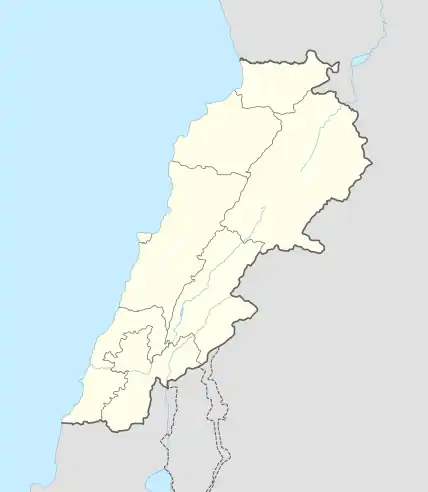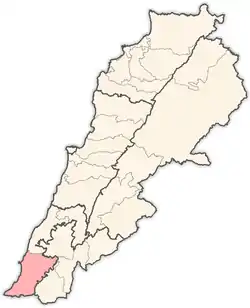Tayr Debba
Tayr Debba (Arabic: طير دبّا) is a small town in the Tyre District in the South Governorate of Lebanon, located 7 kilometres east of Tyre and 88 kilometers south of Beirut.[1] Its total land area consists of 578 hectares and its average elevation is 200 meters above sea level.[1] There are two schools, one public and the other private, in Tayr Debba which collectively enrolled a total of 607 students in 2006.[1]
Tayr Debba
طير دبّا | |
|---|---|
Town | |
 Tayr Debba | |
| Coordinates: 33°16′27″N 35°16′43″E | |
| Grid position | 176/297 PAL |
| Country | |
| Governorate | South |
| District | Tyre |
| Area | |
| • Total | 2.23 sq mi (5.78 km2) |
| Elevation | 700 ft (200 m) |
| Highest elevation | 1,380 ft (420 m) |
| Time zone | GMT +3 |
Name
According to E. H. Palmer, Teir Dubbeh means "the fortress of the bear".[2]
History
In 1881, the PEF's Survey of Western Palestine (SWP) described it: "A village built of stone, containing 250 Metawileh, situated on a ridge surrounded by olives and fig-trees and arable land. There are three cisterns in the village."[3]
Tayr Debba is the hometown of the Hezbollah commander Imad Mughniyeh, who was assassinated in 2008.[4]
Notable people
- Mohamad Haidar (born 1989), Lebanese footballer[5]
- Imad Mughniyeh
References
- "Tayr Debba". Localiban. Localiban. 26 April 2008. Retrieved 26 September 2016.
- Palmer, 1881, p. 11
- Conder and Kitchener, 1881, SWP I, p. 51
- Killed Hezbollah Man Revered in Hometown. Associated Press. 2008-02-10. Retrieved on 2016-09-26.
- "Mohamad Haidar - Soccer player profile & career statistics - Global Sports Archive". globalsportsarchive.com. Retrieved 23 November 2020.
Bibliography
- Conder, C.R.; Kitchener, H.H. (1881). The Survey of Western Palestine: Memoirs of the Topography, Orography, Hydrography, and Archaeology. Vol. 1. London: Committee of the Palestine Exploration Fund.
- Palmer, E.H. (1881). The Survey of Western Palestine: Arabic and English Name Lists Collected During the Survey by Lieutenants Conder and Kitchener, R. E. Transliterated and Explained by E.H. Palmer. Committee of the Palestine Exploration Fund.
External links
- Survey of Western Palestine, Map 1: IAA, Wikimedia commons
